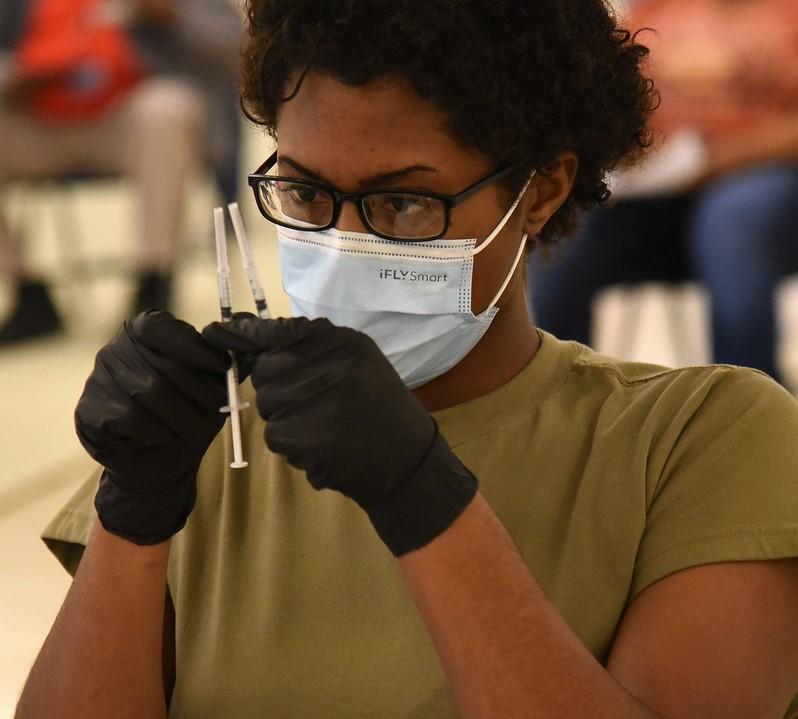For the first time since February, the United States reported more than 900,000 COVID-19 cases last week—with the country represented 20% of global cases—a sign the pandemic surge caused by the Delta (B1617.2) variant has stalled the progress made by an aggressive vaccine rollout that dampened cases this spring and summer.
Cases are on the rise in 46 states, according to USA Today. Hot spots continue in Florida, Louisiana, Texas, Oregon, Hawaii, and Mississippi. Oregon reported 11,564 cases in the week ending Friday, the paper said, topping its December pandemic peak by more than 7.2%.
The United States reported 38,482 new COVID-19 cases yesterday and 382 deaths, according to the Johns Hopkins COVID-19 tracker. The 7-day average of new daily cases is 130,218, according to the Washington Post tracker. New cases have risen 16.8% in the past week, while deaths have climbed by 23.6% and hospitalizations by 14.9%.
In total, the United States has confirmed 36,781,481 cases, including 622,058 deaths.
And the number of children hospitalized in this country is now also at a new pandemic high, with confirmed and suspected pediatric hospitalizations at 1,902 on Aug 14, according to Department of Health and Human Services data, Reuters reports. Though children currently make up about 2.4% of hospitalizations, that percent is expected to climb as people 12 years and older are increasingly vaccinated, leaving younger children vulnerable to Delta.
Only 50.7% of the total US population is vaccinated against the virus, with 72% of Americans over 18 with at least one dose. In total, the Centers for Disease Control and Prevention COVID Data Tracker shows 415,957,645 COVID-19 vaccine doses have been delivered in the country and 356,433,665 have been administered.
Considering added vaccine doses for some
Francis Collins, MD, PhD, director of the National Institutes of Health, told the Associated Press that elderly Americans may get an added vaccine dose as early as this fall. His statements come just a few days after the Food and Drug Administration approved a third dose of mRNA vaccines for moderate and severely immunocompromised Americans.
"There is a concern that the vaccine may start to wane in its effectiveness," Collins said. "And delta is a nasty one for us to try to deal with. The combination of those two means we may need boosters, maybe beginning first with health care providers, as well as people in nursing homes, and then gradually moving forward."
Collins also said any unvaccinated American was currently a "sitting duck" for the Delta variant.
Seven of the country's leading health associations—the Association for Professionals in Infection Control and Epidemiology (APIC), Infectious Diseases Society of America (IDSA), Society for Healthcare Epidemiology of America (SHEA), Society of Infectious Diseases Pharmacists (SIDP), Pediatric Infectious Diseases Society (PIDS), American Industrial Hygiene Association (AIHA), and National Association of School Nurses (NASN)—today called on governors from both red and blue states to put aside politics and promote vaccination.
In an open letter sent to all US governors, the group pleads with state leaders "to set aside differences to support important public health guidance to save the lives of many Americans during the current stage of the pandemic."
The letter urges governors to promote COVID-19 vaccination and make vaccines a condition of employment for healthcare and all government employees, require universal masking indoors, and encourage all school staff and students to conduct school fully masked.
Several Republican governors in states now seeing virus surges have banned mask and vaccine mandates.
Other US developments
- Los Angeles County recorded 3,356 new COVID-19 cases yesterday, according to the Los Angeles Times. COVID-19 hospitalizations in the county are up nearly 51% from 2 weeks ago.
- The Texas Supreme Court yesterday granted an emergency stay of lower court rulings that allowed cities and school districts in the state to defy Gov. Greg Abbott and implement mask mandates, the New York Times reported today.
- Nursing homes in Florida are once again restricting visitors and limiting group activities in response to the surge in COVID-19 cases, the Wall Street Journal reports.





















